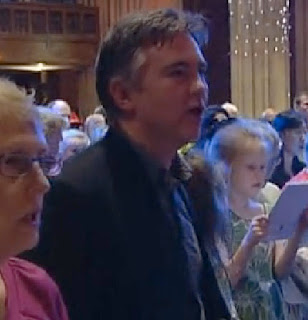Just some quick words as follow-up to the two instalments of an article by Maurice Roberts in the August-September, 1989 issue of the Banner of Truth Journal under the title of "
The Interpretation of Providence in History."
How many Christians today would agree with Roberts when he said "
It is the duty of the church to interpret history."? I suspect the percentage would be less today than when Roberts made that statement and much less than would have been the case a couple of centuries ago. The majority of those reading this blog would also question the point of my continually making reference to the articles of people twenty to fifty years ago. It is all connected!
Our Lord Jesus Christ reprimanded the Pharisees and Sadducees for not interpreting the signs of the times (Matt. 16:1-3) and also cautioned His disciples to look for the signs of the times (Matt. 24). Interpreting the events of past and present is the duty of Christians and, in this regard, it is helpful for me to bring to readers' attention the issues writers of some decades or more ago were wrestling with so that we can relate them to our present circumstance.
Roberts rightly contends that "
A man's theology always determines his view of providence." Events of the past two centuries have seen the church, by majority, giving over to the interpretation of our world and the events if history to secular reasoners. This has fed a foe weak at first but now monstrously strong. So much is this so that one is ridiculed if an attempt is made to present an interpretation of our world and its events from a theological perspective. Today you are seen as a religious extremist if you put a biblical perspective on any of the earth sciences, history, medical science (including psychology), politics etc. This scene is far removed from times long past.
In the face of such ridicule or potential ridicule many Christians and those who errantly purport to be Christian cower and retreat into a compromise with the weapons of choice of the secular foe eg anti-biblical interpretation of history, dating of early historical events, anti-biblical interpretation of earth sciences and deference to anti-theist intellectuals.
This brings to mind Roberts' citation of the contention between Elijah and King Ahab (1 Kings 18). The incident described in that passage of Scripture, an event of history, has similarity with the present situation of compromising Christians and purported Christians dealings' with Christians who remain faithful to God's Word on the matter of Origins (Biblical Creationists). The former grouping and the latter group see each other as the "
troubler of Israel" (the Church). The former grouping regard Biblical Creationists as an embarrassment to the Church, the cause of division within the Church and a stumbling-block to people coming to Jesus Christ. The latter group regard the former as being encouragers of compromise and a hindrance to the Church by bringing judgement from God for unfaithfulness to His Word.
Looking to Roberts again, he said "
A man's theology always determines his view of providence" and a reverse principle also applies viz. "
The way a man interprets providence proves his real theology". To demonstrate this principle Roberts cites a book by Alan P. F. Sell titled "
Defending and Declaring the Faith" which by title purports to defend and uphold the Christian faith practiced (in Scotland). However, the content of the book indicates the author admires and praises some men who, in earlier times, were disciplined for heretical views on Scripture.
Commencing in the earlier part of the Nineteenth Century and continuing with pace through the Twentieth and into the present Century, the providence of God in Creation is being interpreted by the majority in the Church in a way contrary to and, it is reasonable to presume heretically, by the Reformers and Puritans. Concerns such as reassigning the génre of Genesis 1, the non straight-forward reading of the passage, death in the world before the Fall and the consequent question mark over the meaning of Christ's death on the cross, the nature of Christ in Creation and Incarnate and the nature of the New Creation all arise from the way Scripture is being interpreted by the majority in the Church today. The stated concerns are riddled with heretical cancers.
Maurice Roberts, when writing more than twenty years ago, brought out some helpful points in interpreting the times for his readers then and for us today. The issue of concern over Roman Catholicism has waned in today's climate but Roberts' mention of the theological liberal's disdain for "
Antediluvian confessionalism" seems to have gained greater weight of carriage today through "
Antediluvian confessionalism" being subjected to disdain from so-called evangelicals.
Yes indeed, it is our duty to interpret history and to interpret the signs of the times. Declension has characterised the life of the Church in Western Society for at least a Century and this has coincided with the rise of heretical interpretation of Genesis 1 and a disjointed and exceedingly heretical understanding of the Nature of Jesus Christ in Creation and Incarnate.
A Reformation in the manner of that some 500 years ago can reverse the declension. Let's pray for that very thing, that God will be glorified, His Name lifted up and the doubters and compromisers brought to repentance.
Sam Drucker
